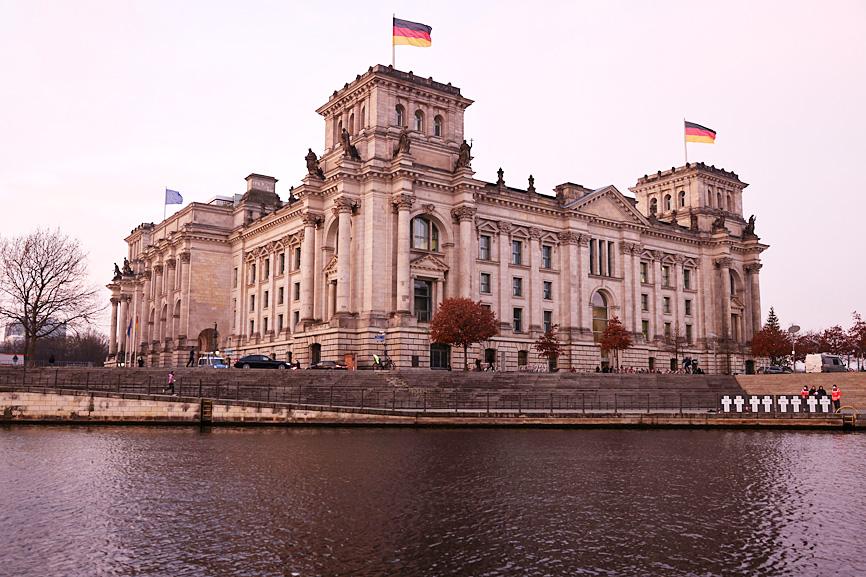The German Bundestag has passed a resolution calling on the government to reassess its Taiwan policy and deepen exchanges with Taipei, but ruled out the possibility of establishing diplomatic relations with Taiwan.
The Petitions Committee of Germany’s new parliament, which met for the first time in October following a federal election in September, passed the resolution on Thursday.
The committee also referred an earlier motion on establishing formal diplomatic relations with the Republic of China to the German Federal Foreign Office and each parliamentary caucus.

Photo: Reuters
The resolution says that since the Federal Republic of Germany and the People’s Republic of China established diplomatic relations in 1972, Berlin has adhered to the “one China” policy, which excludes the possibility of forging diplomatic ties with Taiwan.
However, Germany is supportive of conducting close political, economic and social engagements with Taiwan, and expanding cooperation with Taipei is in the interests of Germany and Europe, it states.
In light of the rapidly changing international situation, the German government should re-evaluate its policy toward Taiwan, including potentially recognizing it as a sovereign state, and considering deepening exchanges and cooperation, the resolution says.
The motion asking Germany to establish diplomatic relations with Taiwan was initiated by German national Michael Kreuzberg in May 2019, and received more than 50,000 signatures in October of that year, requiring that it be sent to the Bundestag for discussion.
The Petitions Committee held a public hearing on the motion in December 2019.
At the hearing, Petra Sigmund, director-general for Asia and the Pacific at the German Federal Foreign Office, said Taiwan and Germany share values, such as democracy and freedom, and conduct frequent exchanges in the economic, cultural and academic spheres.
Germany plans to expand ties with Taiwan, she said.
However, Germany excludes the possibility of establishing diplomatic ties with Taiwan under its “one China” policy, Sigmund said.
The petition was subsequently shelved.
Taiwan’s representative office in Germany welcomed the passage of the resolution on Thursday and thanked German lawmakers for supporting improved relations with Taiwan, saying that it looks forward to seeing the German government’s response to the motion.

The Central Election Commission has amended election and recall regulations to require elected office candidates to provide proof that they have no Chinese citizenship, a Cabinet report said. The commission on Oct. 29 last year revised the Measures for the Permission of Family-based Residence, Long-term Residence and Settlement of People from the Mainland Area in the Taiwan Area (大陸地區人民在台灣地區依親居留長期居留或定居許可辦法), the Executive Yuan said in a report it submitted to the legislature for review. The revision requires Chinese citizens applying for permanent residency to submit notarial documents showing that they have lost their Chinese household record and have renounced — or have never

A magnitude 5.6 earthquake struck off the coast of Yilan County at 12:37pm today, with clear shaking felt across much of northern Taiwan. There were no immediate reports of damage. The epicenter of the quake was 16.9km east-southeast of Yilan County Hall offshore at a depth of 66.8km, Central Weather Administration (CWA) data showed. The maximum intensity registered at a 4 in Yilan County’s Nanao Township (南澳) on Taiwan’s seven-tier scale. Other parts of Yilan, as well as certain areas of Hualien County, Taipei, New Taipei City, Taoyuan, Hsinchu County, Taichung and Miaoli County, recorded intensities of 3. Residents of Yilan County and Taipei received

Taiwan has secured another breakthrough in fruit exports, with jujubes, dragon fruit and lychees approved for shipment to the EU, the Ministry of Agriculture said yesterday. The Animal and Plant Health Inspection Agency on Thursday received formal notification of the approval from the EU, the ministry said, adding that the decision was expected to expand Taiwanese fruit producers’ access to high-end European markets. Taiwan exported 126 tonnes of lychees last year, valued at US$1.48 million, with Japan accounting for 102 tonnes. Other export destinations included New Zealand, Hong Kong, the US and Australia, ministry data showed. Jujube exports totaled 103 tonnes, valued at

BIG SPENDERS: Foreign investors bought the most Taiwan equities since 2005, signaling confidence that an AI boom would continue to benefit chipmakers Taiwan Semiconductor Manufacturing Co’s (TSMC, 台積電) market capitalization swelled to US$2 trillion for the first time following a 4.25 percent rally in its American depositary receipts (ADR) overnight, putting the world’s biggest contract chipmaker sixth on the list of the world’s biggest companies by market capitalization, just behind Amazon.com Inc. The site CompaniesMarketcap.com ranked TSMC ahead of Saudi Aramco and Meta Platforms Inc. The Taiwanese company’s ADRs on Tuesday surged to US$385.75 on the New York Stock Exchange, as strong demand for artificial intelligence (AI) applications led to chip supply constraints and boost revenue growth to record-breaking levels. Each TSMC ADR represents